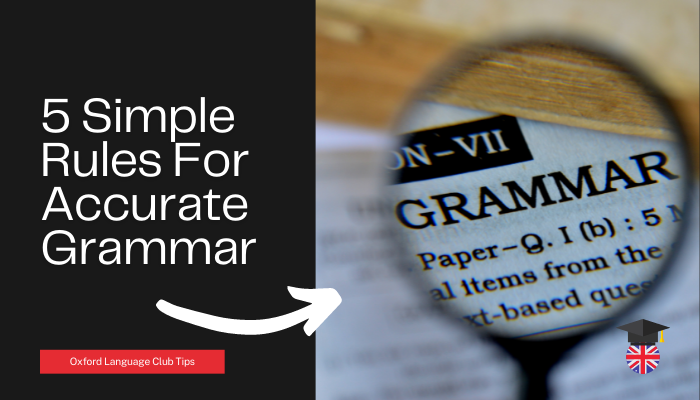


The ‘problem’ with English grammar isn’t that it’s very complex or difficult – at least, compared to some other languages. The problem is that there are always lots of little rules – and many, many exceptions.
So how do you deal with this problem? You have two choices:
Here are five simple rules for accurate English grammar that will help you feel more confident when you speak.
Only one determiner at a time
‘Determiners’ are words that come before nouns. Examples of determiners are articles, possessives, and words like “this” or “that”.
The general rule is that you can only have one of these words before a noun.
So you can say “my book”, “another book”, “the book” or “this book”, but NOT “my the book”, “a my book”, “my another book” or “my that book”.
Prepositions are followed by nouns / pronouns
For example, we say “Before leaving” or “Before you leave”, but NOT “before to leave”. Remember that “leaving” in the example “Before leaving” is a gerund (a type of noun).
In the phrase “look forward to”, the “to” is a preposition – not a part of the infinitive. So it’s correct to say “I look forward to meeting you” or “I look forward to our meeting” – NOT “I look forward to meet you”.
Only one auxiliary at a time
You can only have one modal auxiliary in the same place. So you can say “I will phone you later”, but not “I will can phone you later”. If you want to express a future ability, replace the “can” with “be able to”. You can say “I will be able to phone you later”, for example.
Equally, you can’t use another auxiliary with a modal auxiliary. So you can say “I can’t phone you later”, but NOT “I don’t can phone you later”.
The Present Perfect is a present (not a past) tense
It helps to think of the “have done” form as a present, rather than a past tense. This means that there’s always a connection to the present when you use the present perfect. For example:
“I’ve been there before” (so I have a memory of it now in my head)
“I’ve been here for a week” (so although I arrived here a week ago, I’m still here)
“I’ve passed my driving test” (so although I passed the test recently, I can now drive legally)
On the other hand, if you include a time reference, you can’t use the Present Perfect. So:
“I went there last summer.”
“I arrived a week ago.”
“I passed it on Tuesday.”
Negatives are single, not double
Many languages have two negative forms, but you only need one in English. So we say “I don’t know” or “I don’t know anything”, but NOT “I don’t know nothing”.
But… you can express two negative ideas together. For example, “I can’t help him” means that I’m not able to help him. But “I can’t not help him” means that I can’t just stand here and not help. I feel that I should help him! In this situation, you’d stress the “not” to show that it isn’t an option to refuse to help him.






















